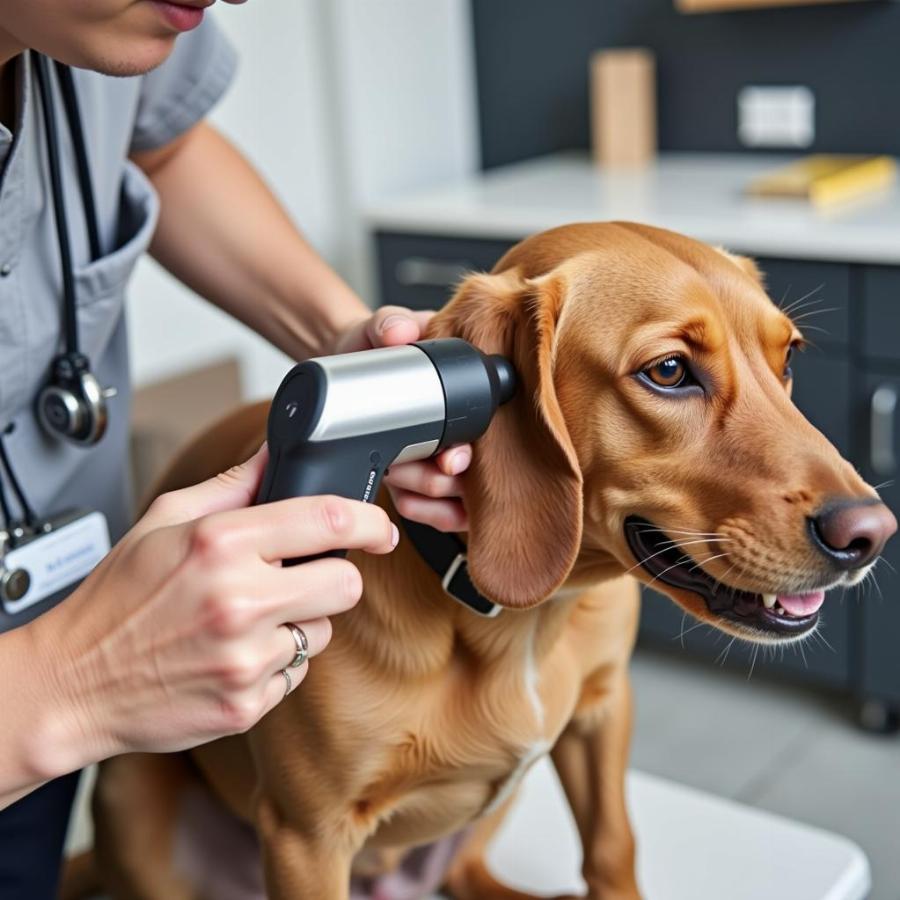Has your dog’s ear suddenly become puffy and swollen? A swollen dog ear can be alarming for any pet owner, and it’s crucial to understand the potential causes and treatment options. Swelling in a dog’s ear can be caused by a range of factors, from allergies to infections, and it’s essential to seek veterinary attention for accurate diagnosis and treatment.
This comprehensive guide will explore the common causes of swollen ears in dogs, the accompanying symptoms to watch out for, and the best course of action to ensure your furry friend receives prompt and appropriate care.
What Causes a Swollen Dog Ear?
Understanding the potential causes of your dog’s ear swelling is crucial for effective treatment. Here are some of the most common culprits:
Ear Infections
Ear infections are among the most frequent reasons for swollen dog ears. They can be caused by bacteria, yeast, or a combination of both. Dogs with floppy ears or those prone to swimming are particularly susceptible to ear infections.
Allergies
Just like humans, dogs can suffer from allergies, and these allergies often manifest as ear problems. Common allergens include pollen, dust mites, mold, and even certain foods.
Ear Mites
These tiny parasites are highly contagious and can cause intense itching, inflammation, and swelling in the ear canal.
Foreign Objects
Grass seeds, dirt, or other small objects can become lodged in your dog’s ear canal, leading to irritation, inflammation, and subsequent swelling.
Trauma
Injuries to the ear, such as bites, scratches, or blunt force trauma, can also cause swelling.
Aural Hematomas
These are blood-filled swellings that occur between the cartilage and skin of the ear flap. They are often caused by head shaking or scratching due to an underlying ear infection or allergy.
Recognizing the Symptoms
A swollen ear is often just one sign of a problem. Be vigilant and look for these additional symptoms:
- Head Shaking or Tilting: Dogs often shake their heads or tilt them to one side in an attempt to relieve the discomfort of a swollen ear.
- Scratching at Ears: Excessive scratching or pawing at the ears is a telltale sign of irritation.
- Ear Discharge: You may notice a foul-smelling discharge from the affected ear. The discharge can vary in color and consistency depending on the cause of the swelling.
- Redness and Inflammation: The ear flap and ear canal may appear red and inflamed.
- Odor: A yeasty or foul odor emanating from the ear is a strong indicator of an infection.
- Pain: Your dog may exhibit signs of pain when you touch their ears.
- Hearing Loss: In severe cases, swelling and inflammation can lead to temporary or permanent hearing loss.
When to Seek Veterinary Care
If you notice any of the above symptoms, it’s crucial to schedule an appointment with your veterinarian as soon as possible. Early diagnosis and treatment can prevent the condition from worsening and potentially leading to complications.
Diagnosing the Problem
Your veterinarian will perform a thorough physical examination, including a close inspection of your dog’s ears. They may also take a sample of any ear discharge to examine under a microscope to identify the presence of bacteria, yeast, or ear mites.
Treatment Options
The treatment for a swollen dog ear will depend on the underlying cause:
- Ear Infections: Your veterinarian will likely prescribe ear drops or oral antibiotics to clear the infection.
- Allergies: Identifying and avoiding the allergen is key. Your vet may recommend allergy testing to pinpoint the culprit. Antihistamines or other allergy medications may also be prescribed.
- Ear Mites: Topical or oral medications are effective in eliminating ear mites.
- Foreign Objects: Your vet will safely remove any foreign objects from your dog’s ear canal.
- Aural Hematomas: Treatment often involves draining the hematoma and addressing the underlying cause, such as an ear infection.
Preventing Swollen Dog Ears
Prevention is always better than cure. Here are some tips to help keep your dog’s ears healthy:
- Regular Ear Cleaning: Clean your dog’s ears regularly with a veterinarian-recommended ear cleaning solution.
- Dry Ears After Swimming: Thoroughly dry your dog’s ears after swimming or bathing to prevent moisture buildup.
- Regular Veterinary Checkups: Schedule routine checkups with your veterinarian to catch any ear problems early on.
- Allergy Management: If your dog has allergies, work with your vet to manage them effectively.
Living with a Dog with Chronic Ear Issues
Some dogs are prone to recurring ear infections or allergies. If your dog falls into this category, your veterinarian can recommend a long-term management plan, which may include:
- Regular ear cleaning with medicated solutions.
- Dietary changes to address food allergies.
- Hypoallergenic bedding and cleaning products.
 Veterinary Ear Examination
Veterinary Ear Examination
Frequently Asked Questions
Q: Can I use over-the-counter ear drops for my dog’s swollen ear?
A: It’s not recommended to use over-the-counter medications without consulting your veterinarian. Some ear drops can worsen certain ear conditions.
Q: How long does it take for a swollen dog ear to heal?
A: Healing time varies depending on the underlying cause and the individual dog. Most ear infections resolve within 1-2 weeks with appropriate treatment.
Q: Is a swollen ear an emergency?
A: While a swollen ear doesn’t always constitute an emergency, it’s essential to seek veterinary attention promptly to prevent the condition from worsening.
Q: Can I prevent my dog from getting ear infections?
A: While you can’t completely eliminate the risk of ear infections, regular ear cleaning, keeping ears dry, and managing allergies can significantly reduce their occurrence.
Seeking Expert Advice
Remember, this guide is for informational purposes only and does not substitute professional veterinary advice. If your dog has a swollen ear, consult your veterinarian for a proper diagnosis and treatment plan.
For personalized advice and guidance on your dog’s ear health, contact Beaut Dogs at [email protected]. Beaut Dogs** is your trusted resource for all things dog-related, providing reliable information and expert advice to help you care for your furry companion.